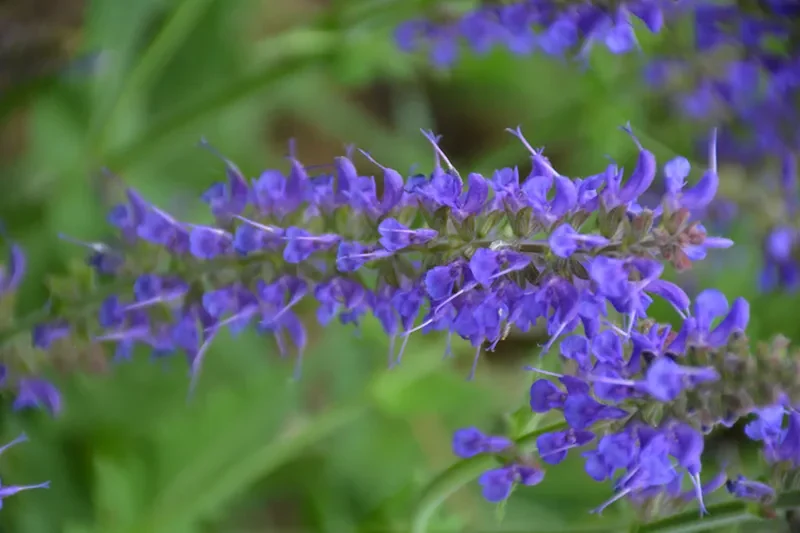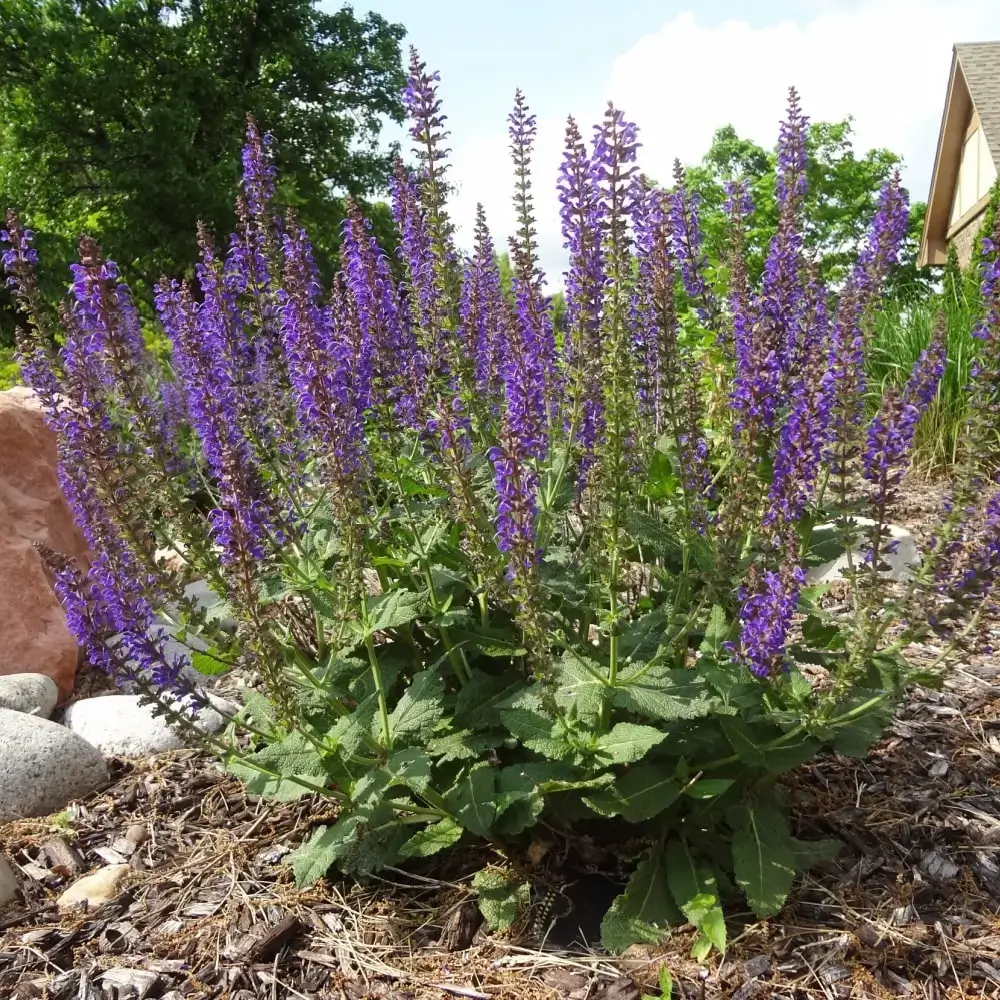Family: Sage
Type: Perennial
Other Common Name: Perennial Salvia, Salvia x superba

May Night Salvia, also known as Meadow Sage, is a striking perennial known for its deep violet-blue flower spikes and lush green foliage. Scientifically referred to as Salvia x sylvestris ‘Mainacht’, this plant is a favorite among gardeners for its vibrant color and ease of care. It’s renowned for its lengthy blooming period, beginning in late spring and often extending through the summer.
Growing to about 18-24 inches in height and spreading up to 18 inches, May Night Salvia is perfect for borders, perennial beds, and cottage gardens. Its compact size and upright habit make it suitable for various garden settings. This plant is particularly loved for its ability to attract pollinators like bees and butterflies, adding life and movement to the garden.
May Night Salvia thrives in full sun and well-drained soil. It’s a drought-tolerant plant once established, making it an excellent choice for gardens in dryer climates. The plant’s long-lasting blooms and aromatic leaves make it a valuable addition to any garden.
Hardiness Zone: 3a-4a
Deer Resistant: Yes
Pet Friendly: Yes
Moisture Preference: Dry to moist
Sun Needs: Full sun
Growth Rate: Medium
Average Height (feet): 2
Average Spread (feet): 1.5
Average Life Span (years): 5
Form: Upright spreading
Flower Color: Purple
Bloom Season: From late spring to early summer
Foliage Color: Green
Foliage Shape: Narrow
May Night Salvia is ideal for creating bold color contrasts in garden beds and borders. Its deep violet-blue flowers stand out against green foliage, making it a focal point in any landscape. Plant it in groups or mass plantings for a dramatic effect, or use it as an accent among lighter-colored plants.
Incorporate this plant into cottage gardens or informal garden styles. Its naturalistic look and profuse blooming blend seamlessly with other perennials and ornamental grasses. May Night Salvia is also suitable for xeriscaping, thanks to its drought tolerance.
Due to its size and vibrant color, May Night Salvia can be used effectively in container gardening. It adds a pop of color to patios, decks, or balcony spaces and pairs well with other sun-loving plants in mixed containers.

In contemporary gardens, May Night Salvia adds a touch of natural beauty with its bold color and structured form. Its simplicity and elegance fit well with modern garden designs.
May Night Salvia is a fantastic addition to pollinator gardens. Its nectar-rich flowers are irresistible to bees, butterflies, and hummingbirds, making it a valuable plant for supporting local wildlife.
In rock gardens, May Night Salvia can be used to add color and height. Its ability to thrive in well-drained conditions makes it a suitable choice for these rugged landscapes.
Use May Night Salvia along pathways or garden edges. Its upright growth habit and vibrant blooms create an eye-catching border that guides visitors through the garden. Pair it with yellow or white flowering plants for a stunning contrast.
Select our pre-made garden layouts to create a landscape that’s uniquely yours. Simple, smart, and customizable!
In spring, May Night Salvia starts to produce lush green foliage, setting the stage for the upcoming bloom.
During summer, it's covered in striking violet-blue flowers, creating a vivid and colorful display in the garden.
In the fall, the blooms of May Night Salvia begin to fade, but the plant's structure continues to add interest to the autumn garden.
In winter, May Night Salvia becomes dormant. While its foliage may die back, the plant's presence can still provide structure in the winter garden, especially in milder climates.
May Night Salvia should be planted in an area with full sun exposure to maximize its blooming potential. Ideal locations include sunny borders, open garden spaces, or in front of taller plants in mixed beds.
This plant thrives best in full sun, requiring at least 6 hours of direct sunlight a day for optimal growth and flowering.
May Night Salvia prefers well-drained soil with a neutral to slightly acidic pH. It can tolerate a variety of soil types but thrives in moderately fertile, loamy soils.
Space May Night Salvia plants about 12-18 inches apart. This spacing allows for proper air circulation and room for each plant to grow to its full potential.
The best time to plant May Night Salvia is in the spring after the risk of frost has passed or in the early fall, allowing roots to establish before winter.
Dig a hole slightly larger than the root ball, place the plant in, fill the hole with soil, and water well. Mulching around the plant can help retain moisture and regulate soil temperature.
Regular watering is important, especially in dry conditions. Keep the soil evenly moist but not waterlogged to encourage healthy growth.
Fertilize in early spring with a balanced, slow-release fertilizer to support vigorous growth and abundant blooming.
Deadheading spent blooms can encourage more flowering. Cut back the plant in late fall or early winter to tidy up and promote healthy growth in the spring.
In spring, clean up any leftover debris from winter and apply fertilizer to kickstart growth. This is also when new watering routines should begin.
Continue regular watering, especially during hot, dry periods. Deadhead regularly to encourage continuous blooming.
Reduce watering and prepare the plant for winter. Pruning can be done after the first frost.
May Night Salvia is a hardy perennial and requires minimal care in winter. Mulching can provide extra protection in colder climates.
May Night Salvia typically blooms from late spring to early summer and can continue into fall with proper care and deadheading.
Yes, May Night Salvia is generally considered deer resistant due to its aromatic foliage.
Absolutely, May Night Salvia can thrive in containers as long as they have good drainage and are placed in a sunny location. Regular watering and fertilizing are key to maintaining its health in container settings.
Sign up below to get exclusive deals, discounts, and new plant collections—delivered straight to your inbox! Plus, stay inspired with the latest gardening tips, landscaping trends, and DIY garden ideas. Start growing with us today!
A big thank you for subscribing to the PBN Design newsletter.
We're thrilled to have you join our community. Get ready for exciting updates, insightful content, and more delivered straight to your inbox.
Stay tuned!
Go backA big thank you for subscribing to the PBN Design newsletter.
We're thrilled to have you join our community. Get ready for exciting updates, insightful content, and more delivered straight to your inbox.
Stay tuned!
Go back